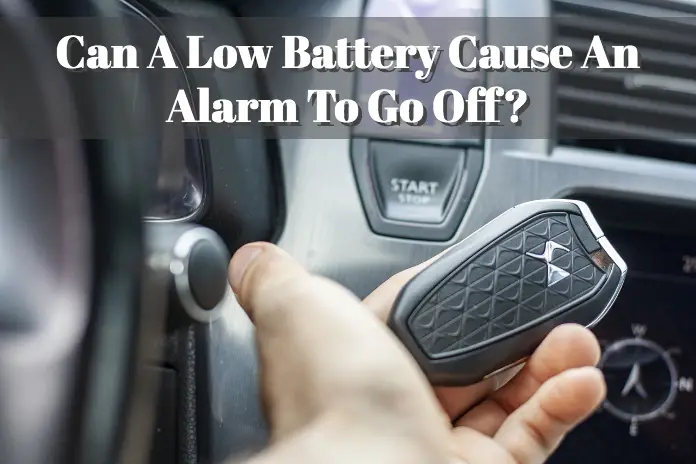
We live in a world where certain people like to profit from things they do not own. This is mostly as a result of living in an unequal society where people sometimes cannot afford to buy certain things brand new from the shop. This here is a market ready to be served by thieves.
What this usually means is you who owns something valuable risk it being stolen. That’s why alarm systems were invented to ward off crooks, and alert you, the car owner, of nefarious activity being conducted against you. However, in some cases, the alarm system that seems to go off on its own, even when there’s no threat to its integrity.
Can a low battery cause a car alarm to go off? Yes, a car alarm will definitely go off when the battery is low. A car alarm wasn’t just designed to ward off thieves and alert car owners, they are also meant to alert owners of issues the car may be experiencing. One of these issues is a low battery.
The alarm will sound when you attempt to start the car. This is to indicate to you that the battery doesn’t have enough juice to crank over the engine. Under normal circumstances, you wouldn’t know the battery was dead or dying other than after various attempts at trying to find out why your engine isn’t cranking over.
When your alarm does go off, you will have to find yourself a voltmeter. This is used to measure how much voltage is flowing out of your battery. A voltage below 12.6 volts would mean you need to get yourself another battery if you don’t want to stall in the middle of the freeway.
A Low Battery isn’t the Only Reason that Your Battery will Go Off
1. Sensitive Shock Sensors
A shockwave sensor is an innovative piece of equipment that has many applications across different industries. In cars, they are used to detect impact and deploy the airbags. They are also used as a part of the alarm system to determine if there is any shockwaves that are going through the car.
You’ve probably seen this; when another car passes by with a loud exhaust or loud music that causes the parked cars to start blaring their alarms and horns as well as flashing their lights. That’s a result of the alarm system being tripped by shockwaves from the loud sounds. The same is also true for when your pet bumps into the vehicle, or your children’s toys do.
Sensitive shock sensors can trip the alarm at any point in time as a result of impulses to the vehicle’s environment. Although these are helpful to your vehicle’s security, having them too sensitive can be a problem as any sort of shockwaves, be it from vibrations through the ground, loud sounds or a slight bump could set off the alarm at any time.
2. Dirty Hood Latch Sensor
A common method favored by car thieves is to go to the hood and take out the fuse that directs power to the alarm system. Well, man wouldn’t be man without innovation, and thus came the hood latch sensor. Whenever a car thief tries to pry open the hood, the sensor will detect this movement and set off the alarm.
As with anything under the hood of the vehicle, the sensor will get dirty. And here is where the problems start. This small component of the alarm system is mostly ignored as most car owners have no idea they even exist.
As a maintenance procedure, you should always wipe down the hood latch sensor to keep your alarm’s integrity high. The alarm will attempt to do this itself, however, the results are terrible. The build up of dirt or grime from the engine will result in the hood sensor translating it as an attempted breaking in. This then causes the alarm to trip.
Cleaning a hood latch sensor does not need any special tools, you can use those already available to you. To achieve this, you will need a microfiber towel, a cleaning brush and some brake fluid. You will need to unplug it and remove it from its mounting. Start by removing the negative terminal from the negative post of the battery. This is to prevent flow of charge from damaging the electronics.
Go ahead and spray the sensor and ensure all the dirt, dust and grime has been removed from it. If there are still stubborn spots, enlist the cleaning brush to help with your efforts. Once the sensor is sparkling from all your elbow grease, give it a gentle wipe down with the microfiber cloth. Re-install it and give it a try.
If that solved the problem, hooray. If it didn’t, the problem could be deeper. It could be that the cables are broken or the sensor itself has sustained some damage. Your electronics system may also be wonky and needs intervention from a professional.
3. Malfunctioning Key Fob
The world has made great leaps in terms of the technology that is now available to vehicle owners. One of these forms of technology is a key fob. These allow you to control some of your vehicle’s functions, such as unlocking and locking the doors, and in others, starting the car at the push of a button.
As with other forms of technology, wear and tear do get to them. Once they start breaking down, the wireless communication means it will send the wrong signals to the car’s alarm system. So, every now and then, your car’s alarm will sound even when there’s no threat to it.
There are several fixes you could look into if the problem is not the aforementioned issues but is the key fob. You could start by replacing the fob’s battery. The acting up could simply be an indicator that the battery is on its last moments of life. You may also need to reset the keys to start a new life with a new battery. If the problem is still persistent, you could look into reprograming the keys.
Sources:
1. How Does a Shock Sensor Work? – Alarm Grid





